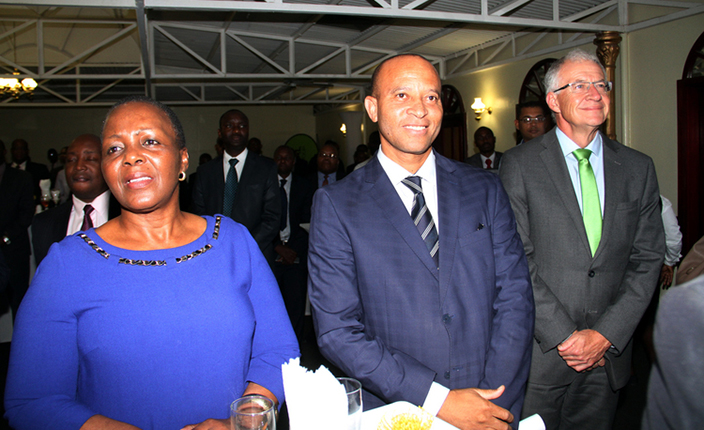I was forced to play sungura

Godwin Muzari Memory Lane —
Since releasing the album “Wamatuka”, Gift Amuli became a popular sungura musician yet he initially hated the genre.
Amuli did not like sungura at all. Because of his background in contemporary music, the musician viewed sungura as a primitive genre. In his early days, Amuli got grooming from Zig-Zag band.
After working with Zvishavane Sounds for some years, providing entertainment for miners in the town, Amuli got a chance to record with Gramma Records. Because he had been used to contemporary music, the musician planned to record along those lines but producers at Gramma told him they wanted a sungura musician.
He was told to choose between playing sungura and forfeiting his studio opportunity.
“Ndakati ah, what will my friends say when they hear I am playing sungura. Mukaradhi kuridza sungura? I refused but the producers cornered me. I had to do sungura. I had no option,” said Amuli as he went down memory lane this week.
The musician went back to Zvishavane and told other band members about the record company’s position. They resolved to do sungura songs in order to have their first recording.
“We did our sungura compositions, but I decided to be behind the scenes. I was still ashamed. Trevor Madamombe did lead vocals and we recorded our debut album ‘Remekedza Upenyu’ in 1995 as Zvishavane Sounds.”
To Amuli’s surprise, the album did extremely well especially through tracks “Chitototo” and “Ndirimuranda”. It was an exceptional starting point for the group. The success of the album changed Amuli’s perception towards sungura. Those days piracy was still at low levels and the group made a lot of money from sales royalties.
“So sungura can pay this much? I asked myself. I could not believe it. Zvishavane Sounds immediately became a popular band and ‘Chitototo’ was playing in every corner of the country. That was my turning point. That was the year I resolved to be a sungura musician. We made a lot of money, I tell you and we began doing shows outside the mine. I was a changed man and I was ready to go around bragging about being a sungura musician.”
However, the group’s promising start failed to lead the way for their future projects because the next album “Kudzidzisana” did not do well.
Determined to pursue sungura further with the aim of reaching “Chitototo” level, Amuli went alone after some years and recorded his own album in 2002 titled “Wedangwe”. But lady luck was no longer smiling at him and the album was a flop again. He wondered why sungura success had been such a tempting teaser that only worked to change his perception through good income and left him hanging for many years thereafter.
Suddenly, the sungura channel looked bleak and Amuli retraced his steps to contemporary music.
He joined Andy Brown as bass guitarist and another period of exciting stories began. Brown was at the peak of his career and they had numerous international tours that brought back confidence to Amuli.
“We shared the stage with big musicians like Youssou N’Dour, Salif Keita, Jabu Kanyile, Salif Keita and Femi Kuti among others. We toured various countries and we had a serious following in South Africa and would perform there several times.
“Andy was a talented musician who did not want any funny tricks in studio or on stage. He was one guy who kept his band members on their toes. But sometimes he was unpredictable. It needed someone who was close to him to understand him better.
“It was worse when he got drunk because he would just burst at times. I understood him and many other band members also did. We never took anything he said when he was drunk seriously because we knew it was a passing phase and everything would be well when he got sober.”
When things began getting bad at Brown’s Storm, Amuli decided to take a break from music. He went to look for a job in South Africa in 2005.
However, as he was working across the Limpopo, music was still in his heart. After about a year Amuli came back home to record another album.
“When I came back in 2006 I heard that producers at Gramma Records were looking for me. They wanted someone who could do a hit like ‘Chitototo’. Coincidentally, I had come with new compositions and I was ready to go into the studio. It was back to sungura once again.”
Authorities at Gramma were really keen to have something big from Amuli and they booked him at a popular hotel when he was recording. They also hired guitarists for him and he worked with stars like Spencer Khumulani, Innocent Mjintu, Gift Sixpence, Thomas Dasinto and Donalad Gogo. The result was the album “Wamatuka” which became an instant hit. The follow-up video, which featured dance group Girls of Peace was also popular.
“Wamatuka” tussled with Joseph Garakara’s “Idya Banana” for top spots on various local charts and the name Gift Amuli became popular in showbiz.
Once again, the sungura genre that he previously loathed brought massive success. He was again smiling to the bank and it was the most fruitful stretch of his career.
The following album “By Ginya” in 2008 also did well although it failed to match “Wamatuka” standards.
In 2011 he did “Machena” and in 2013 he came up with “Bhora Mberi”. As fortunes began waning, Amuli decided to look for a job once again. He briefly relocated to South Africa before setting a new base in Gweru. He managed to set a studio called Amuli Media in Gweru where he recorded his upcoming album “Masvingo” that will be released on December 9.
The album is being mixed by Jabulani Ndlovu at his Tru Tone studio. They are currently doing final touches and Amuli believes the album will bring back the good old days. He is planning a massive launch for the album.











Comments